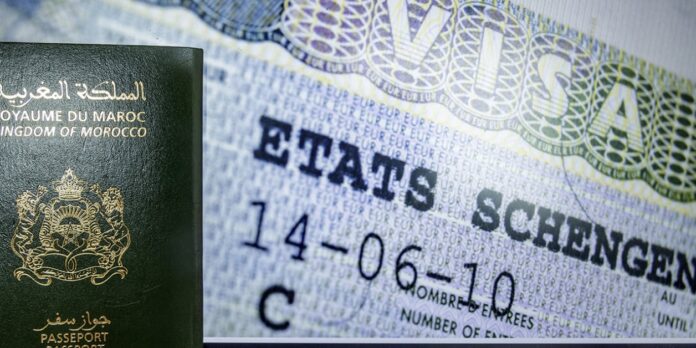It is a “historic” measure for some, “insufficient” for others. In September 2021, France announced that it had considerably strengthened the conditions for granting visas to Algeria, Morocco and Tunisia. Algiers and Rabat then saw their Schengen visa issuance fee halved, while this reduction was 30% for Tunis. For France, this movement is part of a persuasion strategy that aims to accelerate the process of repatriating illegally staying North African citizens to their country of origin.
The French government believes that the consular passes (LPC) issued are sparsely across countries targeted by the retaliatory measure. This administrative condition is mandatory if the people affected by the removal measures do not have travel documents (passport or travel document). Being a prerogative of the sovereignty of States, this situation obliges France to request the diplomatic representations of the countries to which the foreigners declare they belong.
A situation made worse by Covid-19
Closing the borders of the main countries of return (Algeria, Morocco and Tunisia) during the peak of the Covid-19 pandemic would have further worsened the situation. According to the French government's 2020 annual performance report: “The closure of certain consular posts, the drastic drop in commercial air traffic and the drop in the number of available places of detention explain the difficulties suffered since the beginning of the crisis. »
This same report put also presented the obligation to carry out a PCR test, imposed as an important condition for repatriation. A measure widely boycotted by foreigners awaiting forced removal. “The number of refusals […] opposed […] was 537 in 2020 and 2,582 during the first eight months of 2021”, specifies the General Directorate for Foreigners in France (DGEF).
In Tunisia, PCR tests were mandatory to enter the territory. However, the country managed to welcome the returnees
The “excuse” of mandatory PCR, brandished in particular by Morocco, does not convince the deputy for the 9th constituency of the French abroad, M'jid El Guerrab, who believes that, in the case of the kingdom, this is it. a “political will of the State”. “In Tunisia, PCR tests were mandatory to enter the territory. However, the country has managed to welcome returnees”, he counters. Before mentioning that now, “Morocco is part of a logic of returning to cooperation with France and, in general, with Europe. »
Reinforcement of Schengen criteria
Despite a sharp reduction, the issuance of French visas was never fully processed in the Maghreb countries. Although we note a stricter application of the concession criteria by consular authorities. After speaking with the various consuls of Morocco, Algeria and Tunisia, deputy M'jid El Guerrab notes that “what might have been acceptable before is no longer acceptable today”. “There is a desire to enforce Schengen criteria more strictly. »
For example, the strategies put into practice by visa applicants to arrange their accommodation in France are no longer successful: “We could make a hotel reservation and include it as evidence in the process. Now, a consular officer is likely to call the hotel to confirm payment for the reservation. This often does not happen, which leads to exclusion from the process and visa refusal. »
In 2020, compared to 2019, the number of visas granted to Algeria fell by 73.5%, 71.5% for Morocco and 66% for Tunisia. According to the statistics in Congressman El Guerrab's report on the subject, the visa refusal rates by country for 2019 – that is, before the reduction measure – show that the application of the quota does not have the same impact depending on the country. Thus, in the case of Algeria (refusal of 46%) and Tunisia (refusal of 24%), the quotas imposed by the French government are, respectively, only 4 and 6 points higher than the reality on the ground. For Morocco, on the contrary, this refusal rate was just 18% in 2019. The quota of 50% therefore represents an “increase” in refusal of 32 points.
Extended and intermediate deadlines
In addition to these quotas, there are increasingly complex procedures for obtaining a visa. Since 2018, services consular The French outsourced the collection of visa applications to the service provider TLS Contact. Officially, the time between the request and the appointment is fifteen days. In fact, finding a vacancy within this time frame is a miracle for candidates.
“Four months ago I was unable to access the TLS page to choose the query details”, confides Samia*, a 52-year-old woman from Casablanca who ended up obtaining a short-term visa through an intermediary. These illegal intermediaries saturated the page dedicated to job selection to position themselves as the only ones capable of accessing the appointments offered by TLS Contact. This situation is even more absurd because, with the introduction of quotas, the number of slot options appears to have been significantly reduced.
And other technical problems add up. In December 2021, the terms and conditions for prepayment of visa application fees with TLS Contact were changed. To reserve a place, you must now make payment within two hours – online or via Wafacash – otherwise the appointment will be cancelled. A measure that aims to contain the intermediary procedure and increase the probability of getting an appointment following the standard procedure.
“I paid around 4,000 dirhams (375 euros) in total for processing my case and that of my son. The intermediary asked for 500 dirhams per person to make us an appointment, says Samia*. He then contacted me so I could make the payment and send the generated code. The operation had to be done in less than two hours. I had to do it very quickly. » According to Moroccan criteria – the local minimum wage is around 2,000 dirhams – these costs are exorbitant.
In April 2019, a Casablanca police operation led to the arrest of several intermediaries and the seizure of their IT equipment
For M'jid El Guerrab, neither the TLS provider nor the French consulate are capable of handling the phenomenon: “We cannot stop them from clicking. But give the impression that the system does not work or that visas are not actually issued. » In April 2019, an operation by the Casablanca police led to the arrest of several intermediaries and the seizure of their IT equipment. An operation probably linked to a TLS Contact query for “illegal practice”.
Contacted by young Africaseveral of these intermediaries, presenting themselves on social media as Travel Manager or travel agencies, attest to the growing number of requests since the reopening of borders. “It all started again. Appointments are made very quickly. We have a lot of work at the moment”, complains an intermediary on the Travel Consulting NY Facebook page, which communicates with its customers exclusively via WhatsApp and promises “guaranteed reservation”.
*The first name has summer Changed.

